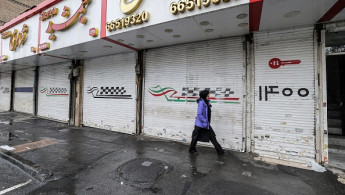Iranian authorities vow to 'put back headscarves on women's heads'
High-ranking clerics, legislators, and conservative politicians have rejected any claims about easing the hijab law in Iran, with some vowing to strictly enforce a law that makes Islamic hijab mandatory for all women in the country.
On Tuesday, Hossein Jalali, a hardline cleric and a member of the parliament, promised to strengthen the forces fighting against any breach of obligatory veiling law in the country, local media reported.
"When unrests come about, there will be riots and an increase in removing the hijab, but when the unrests finish, all the other things will also end," He was quoted as saying.
"All these problems will come to an end in one or two weeks. I want to say the headscarves will be returned on the women's heads," he stressed.
Jalali also added that in the future, even the bank accounts of people who do not obey the mandatory hijab law could be suspended.
The conservative lawmaker's remarks came in response to mistaken reports about scarping the country's infamous "Islamic morality police".
On Saturday, it was reported Iran's Prosecutor General Mohammad Jafar Montazeri said that the morality police units were scrapped.
The report was a wrong translation of remarks by Montazeri in which he rejected the judiciary's responsibility in suspending morality police. Nevertheless, the authorities quickly ruled out the possibility of having any plans to change the law about forced veiling in the country.
Ayatollah Mohsen Araki, a member of the two powerful clerical entities, the Assembly of Experts and the Expediency Discernment Council, also warned that the authority would fiercely respond to the women removing their hijab.
"To all of those who had been deceived [to take off the hijab], we warn they'd better obey the law," he said on Tuesday.
"This nation is determined to enforce the hijab law and would not stop its attempts until it is fully implemented," he added.
Jalali and other conservative clerics have highlighted several times that the mandatory hijab law is one of the leading redlines for Iran's clerical ruling system.
"The collapse of the hijab means the collapse of the Islamic Republic flag," Jalil said on Monday to a group of pro-hijab protestors who organized a sit-in in the holy city of Qom.
Before him, Ahmad Alam al-Hoda, a high-ranking cleric and a close ally to Iran's supreme leader, compared women without Islamic hijab with 'prostitutes', saying, "I hope the officials react with power and end this American story in our country."
Meanwhile, Amnesty International urged the international community not to be misled by the reports about the disbanding of Iran's morality police.
"Compulsory veiling is entrenched in Iran's Penal Code and other laws and regulations that enable security and administrative bodies to subject women to arbitrary arrest and detention and deny them access to public institutions," said Heba Morayef, Amnesty International's Regional Director for the Middle East and North Africa.
"It is important to remember that protesters in Iran are not calling just for the dismantling of the 'morality police' but for the transition of Iran to a new political and legal system that would respect their basic human rights and freedoms," she concluded.
Following the death of Mahsa Amini in morality police custody, nationwide demonstrations against the hijab law began in Iran, and women burnt their headscarves in major Iranian cities.
The brutal crackdown on the protests fueled the anger against the authorities and sparked a new wave of anti-establishment demonstrations, during which security forces killed at least 448.





 Follow the Middle East's top stories in English at The New Arab on Google News
Follow the Middle East's top stories in English at The New Arab on Google News


